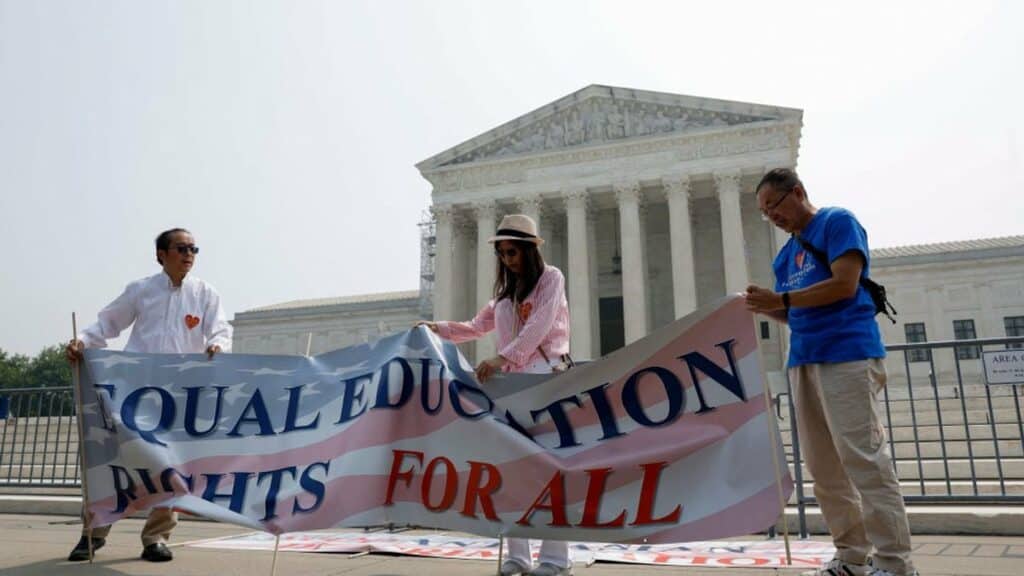
NEWSFEED FROM HRDRIVE.COM
The U.S. Supreme Court’s decision last Thursday holding that admission programs at Harvard College and the University of North Carolina at Chapel Hill were unconstitutional could affect employers’ diversity, equity and inclusion initiatives, according to stakeholders.
Joelle Emerson, co-founder and CEO of DEI consulting firm Paradigm, wrote in a June 29 blog post that while the 6-3 ruling in Students for Fair Admissions, Inc. v. Harvard would not directly govern employer practices that aim to increase diversity and inclusion, a “chilling effect on corporation action on DEI” may be a consequence in the immediate future.
Legal teams, Emerson said, may halt some diversity-focused efforts as they analyze the ruling, similarly to how some organizations paused to consider their DEI programs following the Trump administration’s publication of an executive order outlawing certain concepts in diversity training.
Employers will likely need to reassess their policies to ensure they are properly handling affirmative action issues, Stephen Paskoff, CEO of Employment Learning Innovations, said in an email to HR Dive. That may include conducting analysis to determine whether employment practices yield disparate impacts between people in the workplace or other discriminatory results.
An amicus brief filed in the Harvard case by employers asked the court to hold in favor of the universities, arguing that the business community depends on higher education institutions “to recruit, admit and train highly qualified, racially and ethnically diverse students to become the employees and business leaders of the future.”
In the long run, the high court’s decision will negatively affect efforts to recruit more diverse workforces, Emerson wrote.
“Over the next decade, traditional talent pipelines will become less diverse because of this ruling,” she said. “Companies that want to build competitive, strong workforces are going to have to work harder to build the workforce they need to stay competitive: hiring from non-traditional backgrounds, building strong cultures that make them an employer of choice for underrepresented groups and focusing on retaining and growing those employees.”
For example, some healthcare industry groups said that the ruling will weaken efforts to diversify the U.S. physician workforce, Healthcare Dive reported. Data from the Association of American Medical Colleges show that roughly 6% of active physicians are Black and 7% are Hispanic, while 0.3% are American Indian or Alaska Native.
Charlotte Burrows, chair of the U.S. Equal Employment Opportunity Commission, voiced similar concerns in a press release, stating that businesses rely upon colleges and universities to provide diverse talent pipelines.
“Diversity helps companies attract top talent, sparks innovation, improves employee satisfaction, and enables companies to better serve their customers,” Burrows said, while adding that, in light of the court’s decision, “[i]t remains lawful for employers to implement diversity, equity, inclusion and accessibility programs that seek to ensure workers of all backgrounds are afforded equal opportunity in the workplace.”
Employers should expect to see increased litigation in the coming months and continued scrutiny with respect to organizational DEI programs in the wake of the court’s ruling, Krissy Katzenstein, partner at Baker McKenzie, told HR Dive in an email.
“Today’s decision will have reverberations beyond higher education, including in the workplace,” said Katzenstein. “While not directly applicable to private sector employers, it does reaffirm the long-standing law in the employment space that protected characteristics generally may not be taken into account when making employment decisions.”
HR teams still have a number of tools that can allow them to move further on DEI goals despite the ruling, according to Paskoff, including conducting availability analyses and performing outreach to encourage job candidacy from applications of all backgrounds.
“When done properly, affirmative action, the law and DEI can combine to help employers get the best talent who do their best work, individually and in teams, who participate and speak up about ideas, innovation and other issues and deliver the best talent and results for their organizations,” Paskoff said. “Employers must go back to their company values that focus on fairness, inclusion and respect and make sure their employment practices reflect that every day.”